Our evaluations and opinions are not influenced by our advertising relationships, but we may earn a commission from our partners’ links. This content is created independently from TIME’s editorial staff. Learn more about it.
Food plays an important role in a dog’s digestive health. Diets with exotic proteins and fewer ingredients are popular, but are they right for your dog’s sensitive stomach? Conversations about the best dog food brands can be as controversial as cars and sports teams, but to help pet owners navigate the vast realm of dog foods for sensitive stomachs, I’ve covered my top picks that are available without a prescription. Before you go out and change your dog’s diet, have a conversation with your veterinarian about what’s best for your dog’s nutritional needs.
How to choose the best dog food for sensitive stomachs
Talk with your veterinarian
A pet’s health and diet history should be assessed by a veterinarian to determine if they truly have a sensitive stomach and not another medical condition, such as an endocrine condition called Addison’s disease, or exocrine pancreatic insufficiency, where they lack digestive enzymes. Your veterinarian is also your best resource for determining if your dog should be on a grain-free or grain-containing diet.
If a diet change is needed, your veterinarian will likely recommend a specific food to you (maybe via a twelve week food trial), or they may let you know which ingredients to avoid. Your veterinarian will need to know what treats, chews and supplements you give your dog. In addition to addressing diet, your dog may also need additional products to support their gut health, like a veterinary probiotic that is backed by research (e.g. Purina’s FortiFlora.)
Pay attention to your dog food brand’s protein source
Though not all food intolerances pertain to protein, if a dog has a true allergy to a food, it’s more likely that protein is the culprit than a carbohydrate. Even though determining what ingredients your dog can tolerate often takes time (e.g. a food trial), you may have also noticed that your pup doesn't respond well to certain protein-based treats. Navigating which protein to pick or avoid is best done with your veterinarian’s guidance.
Limited-ingredient diets ideally have just one protein source and one carbohydrate source. But dog foods that are listed as limited-ingredient may actually contain more than one protein or more than one carbohydrate source. For example, Earthborn’s Holistic Venture Limited-Ingredient Roasted Lamb & Butternut Squash contains two protein sources: lamb and Alaska pollack meal.
Then, there are novel proteins. A novel protein food is one that doesn’t contain a standard protein, like beef, chicken, turkey or lamb. Instead, they contain protein sources like kangaroo, bison, or rabbit. To be novel, the protein must truly be one that a dog has never been exposed to.
Instead of an over-the-counter food, your veterinarian may also determine that your pet needs a prescription veterinary diet that contains hydrolyzed protein. When a protein has been hydrolyzed, its structure has been altered to reduce its allergenic potential.
Look at your dog food brand’s fat content
A reduced-fat diet can be helpful for dogs with a sensitive digestive tract. That’s why you may have been told to feed your dog plain, skinless chicken breast and white rice for diarrhea – it’s bland and low-fat. Look for foods whose minimum crude fat is less than 17% (usually, a maximum won't be listed). For example, a minimum of 13%, like Earthborn’s Holistic Venture Duck Meal & Pumpkin, may work better for some dogs compared to ACANA’s Wholesome Grains Duck & Pumpkin, whose minimum is 17%.
Look at the life stage of your dog food brand
Some foods are listed as “All Life Stage” and these can potentially be too much fat for a senior dog (e.g. ACANA’s Wholesome Grains Duck & Pumpkin at 17%.) The packaging will also say in fine print if they are or aren’t suitable for large breed puppies (breeds that will be 70 pounds or more as an adult). When shopping on websites like Chewy, don’t rely on the website's own summary of the food specifications because some of the pages have incorrect information.
For example, on Chewy, neither Canidae PURE Goodness Salmon & Oatmeal Puppy or Acana Wholesome Grains Duck & Pumpkin All Life Stage diet meet the nutritional requirements for large breed puppies and the product packaging states that in fine print. But the summary provided by the website incorrectly says these foods are appropriate for large breed puppies. Look at the manufacturer’s photos or website to clarify if a dog food is suitable for your dog’s age.
Our top picks for best dog food brands for sensitive stomachs
Best dry dog food for sensitive stomach: Zignature Select Cuts Trout & Salmon Meal
With trout as the first ingredient—and no poultry—this food is a great place to start for a dog with a sensitive stomach or dogs with a poultry allergy. Though it’s possible for any protein to be an allergen, fish allergy in dogs is less common than chicken or beef. If your dog turns their nose up at fish, the Select Cuts line also offers turkey and lamb. Many premium brands of dog foods (including Zignature) manufacture diets that contain peas, chickpeas, lentils and/or dry beans, but the Select Cuts line is free of these. These ingredients—also known as pulses—are being further researched, as they’ve been linked to some cases of canine diet-associated dilated cardiomyopathy (DCM,) a type of heart disease. Pulses are particularly common in dry, grain-free dog foods but are sometimes also in diets containing grain.
Specifications:
- Key ingredients: Trout, salmon meal, oats
- Life stage: All Life Stages
- Food type: Dry
- Packaging size: 4, 12.5 and 22 pound bags
What we like:
- Trout is the first ingredient.
- Not high in fat (14.5% crude fat minimum).
- Doesn’t contain chicken or turkey.
- No corn, wheat or soy.
- Doesn’t contain peas, chickpeas, lentils or dry beans.
- Contains omega-3 and omega-6 fatty acids.
- Made in the United States.
What we don’t like:
- Contains more than one type of fish.
- Some dogs may not like fish.
The bottom line:
This fish-based diet is a great option for dogs needing a food with fewer ingredients, no poultry, plus it doesn’t contain peas, lentils, chickpeas or dry beans.
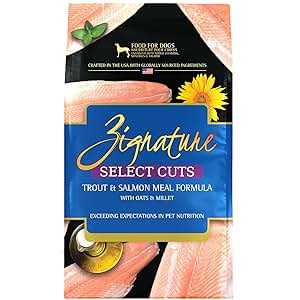
Zignature Select Cuts Trout & Salmon Meal
Best wet dog food for sensitive stomach: Blue Buffalo Basics Skin & Stomach Care Grain-Free Duck & Potato
This duck-based diet is great for dogs who can’t tolerate chicken, turkey, lamb or beef. Though some dogs can have a duck allergy, it’s less likely than a chicken allergy. This food does contain one pea ingredient (pea protein), which is difficult to avoid with grain-free or limited-ingredient diets. The only reason I didn’t choose the whitefish flavor option on this product is because it contains both peas and pea flour.
Specifications:
- Key ingredients: Duck and potatoes
- Life stage: Adult
- Food type: Wet
- Packaging size: 12.5 ounce
What we like:
- Duck is the first ingredient.
- Contains omega-3 and omega-6 fatty acids.
- Contains pumpkin, which is a source of prebiotic fiber.
- Doesn’t contain chickpeas, lentils or beans.
- Also comes in lamb, turkey and whitefish.
- Made in the United States.
What we don’t like:
- Contains pea protein.
- Product label says “single animal protein,” which is true, but this can be misinterpreted as meaning it only contains one protein source, which it doesn’t (pea protein is the fourth ingredient).
The bottom line:
Due to this being a wet food and not dry, where kibble size can be an issue, this duck-based food is a great choice for small and large breeds alike.
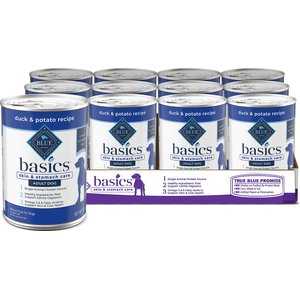
Blue Buffalo Basics Skin & Stomach Care Grain-Free Duck & Potato Adult Canned Dog Food, 12.5-oz, case of 12
Best senior dog food for sensitive stomachs: Wellness CORE Digestive Health Age Advantage
This low-fat, single animal protein diet is great for senior dogs with a sensitive stomach. With nutrients such as glucosamine, chondroitin and omega-3 fatty acids, this food also supports joint health.
Specifications:
- Key ingredients: Deboned chicken, chicken meal, brown rice
- Life stage: Senior (7+ years)
- Food type: Dry
- Packaging size: 4 and 24 pound bags
What we like:
- Low-fat (10.5% minimum).
- Doesn’t contain chickpeas, lentils or dry beans.
- Contains glucosamine and chondroitin.
- Contains omega-3 and omega-6 fatty acids.
- Contains prebiotic fiber.
- Contains seven different strains of probiotic bacteria.
- Made in the United States.
What we don’t like:
- Contains chicken.
- Contains pea protein.
The bottom line:
If your senior dog doesn’t have a poultry allergy and your veterinarian has determined that peas are okay for your pet, this food is one to consider.
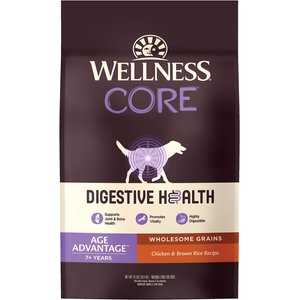
Wellness CORE Digestive Health Age Advantage Senior Chicken & Brown Rice Dry Dog Food, 24-lb bag
Best dog food for puppies with sensitive stomach: Blue Buffalo Basics Skin & Stomach Care Puppy Turkey & Potato
If your puppy does well on turkey, this food is a great choice because it is free of chicken, beef, lamb, corn, wheat, soy, dairy and eggs. It also contains nutrients that support healthy development, such as arachidonic acid (ARA) and docosahexaenoic acid (DHA), both of which are derived from fish oil.
If you need a fish option for a small or medium breed puppy, consider Canidae PURE Goodness Salmon & Oatmeal Puppy. That food, however, does not meet the nutritional needs of large breed puppies. If your puppy can tolerate chicken and turkey, Wellness CORE Digestive Health Puppy: Chicken & Brown Rice is a great option too, including for large breed puppies.
Specifications:
- Key ingredients: Turkey, turkey meal, oatmeal
- Life stage: Puppy
- Food type: Dry
- Packaging size: 4, 11, and 24 pound bags
What we like:
- Turkey is the first ingredient.
- Meets the nutritional needs for small, medium and large breed puppies.
- Small-bite kibble.
- Contains omega-3 and omega-6 fatty acids.
- Contains ARA and DHA.
- Contains five different strains of probiotic bacteria.
- Contains prebiotic fiber.
- Doesn’t contain chickpeas, lentils or dry beans.
- Doesn’t contain chicken, beef or lamb.
- Made in the United States.
What we don’t like:
- Contains peas.
- Turkey-based, which may not be suitable for some dogs.
The bottom line:
This is a great dog food for puppies with a sensitive stomach because the nutrient profile supports healthy development and gut health, plus the first ingredient is a chicken-alternative protein.
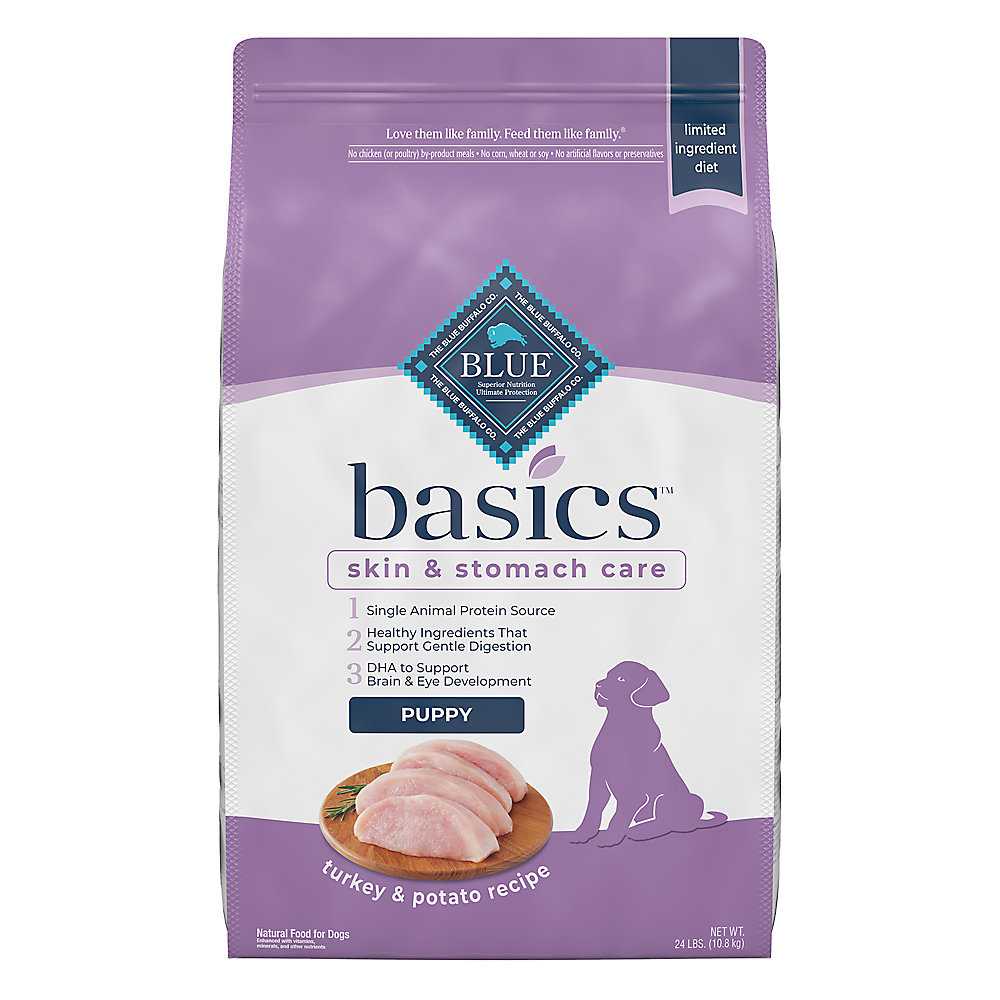
Blue Buffalo Basics Skin & Stomach Care Puppy Turkey & Potato
Best dog food brand for sensitive stomach: Wellness
With their CORE Digestive Health line and two Simple limited-ingredient lines (grain-free and grain-containing,) there are plenty of gut-supporting options to choose from. All of the dry foods contain probiotics and prebiotic fiber. The dry CORE Digestive Health line contains seven dry diets, covering bases for Puppy, Small Breed Adult, Large Breed Adult, Adult and Senior. There are also three canned food options, all of which contain prebiotic fiber.
Simple (a grain-containing line) offers two protein options—duck and lamb—in both canned and dry. As with the CORE Digestive Health canned food, Simple also contains prebiotic fiber. The Simple Grain Free dry line has four options, including one for small breed dogs. Wellness has a total of nine different dry dog food lines to choose from.
Specifications:
- Key ingredients: Options include turkey, chicken, salmon, duck, lamb, and plant-based
- Life stage: Puppy, Small Breed Adult, Large Breed Adult, Adult, Senior
- Food type: Dry and canned
- Packaging size: Dry food ranges from 4 to 24 pound bags. Canned food is either 12.5 or 13 ounces
What we like:
- The option to choose from grain-free or grain-containing diets.
- All nine of their dry dog food lines contain probiotics.
- The packaging lists guaranteed levels of probiotics (again, there’s an important caveat to this towards the end of the article).
- Contains prebiotic fiber in both the dry food and canned food.
- With the exception of the Plant-based with Eggs diet, the CORE Digestive Health line doesn’t contain peas, lentils, chickpeas or dry beans.
- Their wet food packaging is BPA-free.
What we don’t like:
- The Simple and Simple Grain Free lines contain peas.
- The CORE Digestive Health Plant-based with Eggs has pea protein as the second ingredient.
The bottom line:
Wellness is my overall top pick for non-prescription, sensitive stomach dog food because of the variety of choices they offer and the ingredients they include that support gut health and overall wellness.
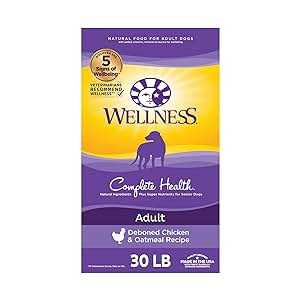
Wellness dog food
Best grain-free dog food for sensitive stomach: Earthborn Holistic Venture Limited-Ingredient Duck Meal & Pumpkin
This higher fiber diet is made with farm-raised ducks (from France) as its only protein source. And it only contains two carbohydrate sources: Pumpkin and tapioca. The Venture line also comes in Alaska pollock, bison, rabbit, lamb, turkey and boar. To my delight, none of the foods in this line have peas, lentils, chickpeas or dry beans.
However, if you opt for one of the other protein options, read the label, as some of them have more than one animal protein source. For example, the rabbit and lamb diets also contain Alaska pollock. But the duck, pollock and turkey choices are single protein diets.
Specifications:
- Key ingredients: Duck meal and pumpkin
- Life stage: Adult
- Food type: Dry
- Packaging size: 4, 12.5, and 25 pound bags
What we like:
- Only one protein source.
- Contains three different strains of probiotic bacteria.
- Contains omega-3 and omega-6 fatty acids.
- Doesn’t contain peas, lentils, chickpeas or dry beans.
- Contains prebiotic fiber.
- Made in the United States (but the ducks in the duck meal are from France).
What we don’t like:
- First ingredient is a meat meal.
- Due to the second ingredient being pumpkin, this food may be too much fiber for some dogs.
The bottom line:
This limited-ingredient diet is a win for me because it has the benefit of containing a single protein source, it’s chicken-free and pea-free, it’s lower in fat (crude fat minimum is 13%) and it’s made in the United States.
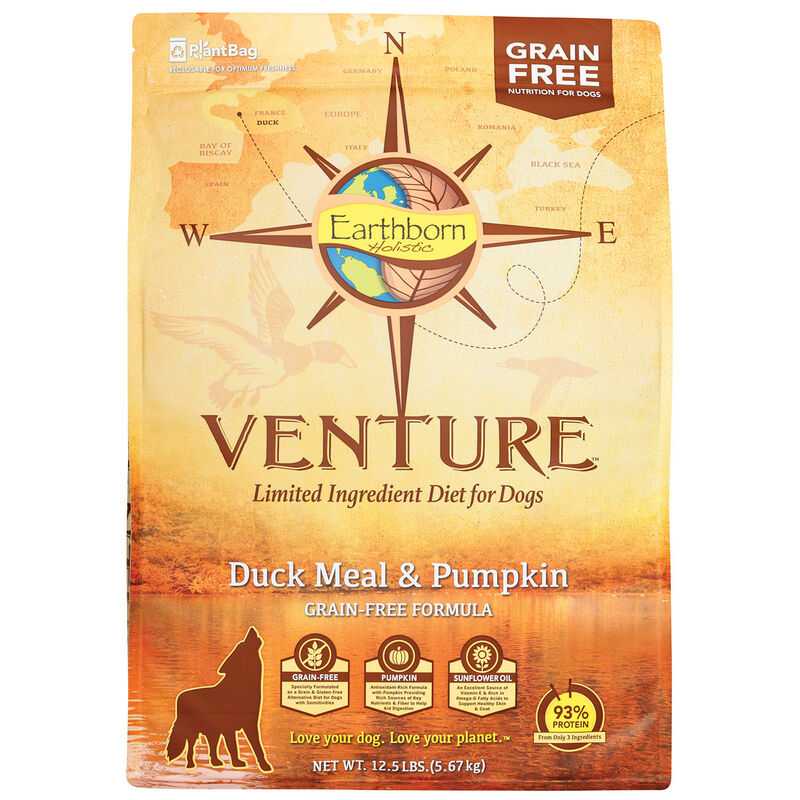
Earthborn Holistic Venture Limited-Ingredient Duck Meal & Pumpkin
Best budget dog food for sensitive stomach: Wholesomes Sensitive Skin & Stomach with Salmon Protein
Wholesomes is made by the same parent company as Earthborn, a family-owned business called Midwestern Pet Foods. This salmon-meal diet is free of peas, lentils and chickpeas and the price point is comparable to Purina ONE Plus Adult Digestive, which is chicken-based and corn-based. There is also a lamb meal and brown rice option.
Not all foods that are listed as “All Life Stages” actually meet the nutritional requirements for large breed puppies but this food does. Always read the fine print on the product itself. The bag will say whether there is an exception for puppies that will be 70 pounds or more as an adult.
Specifications:
- Key ingredients: Salmon meal, brown rice, oatmeal
- Life stage: All Life Stages
- Food type: Dry
- Packaging size: 30 pound bag
What we like:
- Contains omega-3 and omega-6 fatty acids.
- No peas, lentils, chickpeas or dry beans.
- Doesn’t contain poultry, beef or lamb.
- Contains beet pulp, which is a source of prebiotic fiber.
- Crude fat minimum is 12%.
- Made in the United States.
What we don’t like:
- The first ingredient is salmon meal instead of salmon.
- Only available in one size.
The bottom line:
Dog food for allergies, be it digestive and/or skin, tends to be expensive but this food is a great option for someone on a budget whose dog needs to avoid ingredients like chicken.
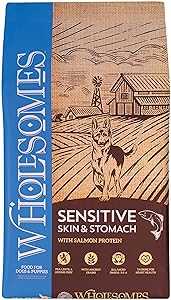
Wholesomes Sensitive Skin & Stomach with Salmon Protein
Signs your dog needs a special dog food brand for sensitive stomachs
There are many signs that your dog might have a sensitive stomach; however, these signs can also be indicative of serious medical issues. If your dog is having any sort of new, recurring, or ongoing digestive issues, please consult with your veterinarian so more serious medical issues are ruled out first.
Vomiting
Dogs with a sensitive stomach can respond to an abrupt diet change with vomiting. They may also vomit when given foods that have a higher fat content or after eating excessive treats. Due to the many reasons for vomiting and the varying degrees of seriousness, if your dog has recurring vomiting, let your veterinarian know right away.
Diarrhea or loose stool
If your pet is having loose stool due to a sensitive digestive tract, it can occur after a change in diet, the introduction of a new treat or if they got into the trash. In addition to noting what the possible trigger was, make sure to note things like frequency of loose stool (e.g. once or twice a day or multiple times a day) if there is blood or not, and if your pet is straining to defecate or not. These pieces of information will help your veterinarian arrive at a diagnosis.
Flatulence
Passing gas, or flatulence, can occur for many reasons, some of which don’t specifically have to do with diet. But for dogs with a sensitive digestive tract, suddenly introducing them to a new food may cause them to experience flatulence. You might also hear gut sounds. That is, your dog’s belly is gurgling. These things may also arise if a dog ingests something they shouldn’t have. Sometimes, flatulence can occur on an ongoing basis when a food is poorly digested because it contains certain fiber-containing ingredients like peas, soybeans and beans.
Appetite change
When dogs with a sensitive stomach aren’t responding well to something they ate, one of the symptoms can be a decrease in appetite, or not wanting to eat at all. Did you just change your pet’s diet or add in a new treat? Did you recently have a family event at your house with lots of people and irresistible food? Or does your dog share your interest in indoor or outdoor plants and is sampling them?
Please discuss a decreased appetite with your veterinarian right away because it can be a sign of a major medical issue, such as a gastrointestinal foreign body (e.g. a toy trapped in the intestinal tract.) Waiting even a few days to address this can have dire consequences.
What goes into a quality diet for dogs?
Generally, a quality diet for dogs promotes good gut motility, supports bacterial diversity in the intestinal tract and reduces gut inflammation. A certain food can be part of a quality diet and still not be digestible for a particular pet. To complicate things for the pet food shopper, food packaging sometimes states the product is “highly digestible,” (like my top pick listed below). However, this term doesn’t have a standardized definition.
What goes into digestibility?
There are many factors that are involved in what makes the best dog food brands digestible for a certain dog, including:
- The digestibility of the protein source itself, for example, exotic protein sources (e.g. kangaroo, buffalo or alligator) compared to standard ones like beef, chicken or turkey.
- Allergies to certain ingredients.
- How a food has been processed.
- What breed your dog is. For example, smaller breeds are better able to digest food in general than larger breeds.
- The quantity and type of fiber in the dog food brand. Fiber itself is nondigestible, but it does affect how a dog’s digestive tract responds to the food. Fiber can also affect how the protein in a diet will be digested. For one pet, more fiber may be needed but for another, it may make their condition worse.
- Dietary fat. Fat definitely makes food more palatable to dogs. However, some dogs with chronic gut issues may have difficulty with fat digestion and their gut may require a low-fat food.
Factors that can cause a sensitive stomach for your dog
So what food should your sensitive-stomach-pup eat? Unfortunately, there’s no simple answer that works for all dogs because the reasons for a sensitive stomach (or sensitive digestive tract) are vast, and can be caused by factors inside or outside of the digestive tract. Factors from within the digestive tract include things like your dog eating something they shouldn’t have, a food allergy, abrupt diet changes, intestinal parasites or a disruption in the gut bacterial population due to antibiotics. Factors from outside the digestive tract include things like kidney issues, pancreatitis or exocrine pancreatic insufficiency.
How we selected the best dog foods for sensitive stomach
Quality
I selected these foods based on the quality of ingredients, favoring meat and meat meal over meat by-products. These diets are also formulated without corn, wheat or soy. I selected diets that contain nutrients which support digestion and overall health, such as prebiotic fiber, probiotics and omega fatty acids. Some even contain glucosamine +/- chondroitin for joint health.
The caveat with probiotics in food, however, is that even if it’s applied after the dog food has been processed, probiotics aren’t going to stay viable in an open, non-refrigerated bag. They also don’t withstand long storage. So, how long ago was the food produced? This is one of the reasons why a dog on a food containing probiotic may still need additional probiotic supplementation.
Labeling
All of the foods I chose are from established, reputable brands. The diets meet the nutritional guidelines of the Association for the American Feed Control Officials (AAFCO) for the life stage for which they are labeled. Due to the retail scope of the article and the inability of pet owners to obtain veterinary therapeutic diets without a prescription, those diets were not covered. Only foods labeled specifically as sensitive stomach, digestive health or limited-ingredient were reviewed.
Pulses and exotic protein
Whether or not a food contained pulses that have become common in dog food (peas, lentils, chickpeas or dry beans) was also a big factor, due to the FDA’s concern that, for some dogs, these ingredients may be linked with diet-associated DCM, a type of heart disease. Since more research is needed, I avoided exotic protein sources for the same reason.
Exotic protein and/or pulses caused me to not pick foods by many brands, such as Solid Gold, ACANA, Orijen, Taste of the Wild and Canidae. For example, Solid Gold’s Leaping Waters Sensitive Stomach Salmon and Vegetable contains chickpeas, lentils, and peas as the third, fourth and fifth ingredients, respectively. And Orijen’s Original Grain-Free Dry Dog Food contains red lentils, pinto beans, navy beans, green lentils, chickpeas and peas.
After evaluating your pet’s health and nutritional needs, your veterinarian is the best person to decide if your dog should be on an exotic protein diet and if a diet containing peas, lentils, chickpeas, or dry beans is okay.
Frequently asked questions (FAQs)
What food is good for dogs that throw up?
There is no one food that will work for all dogs who vomit because there are numerous reasons for vomiting. For dogs with a sensitive stomach, things like food palatability, fat content, fiber type and quantity, protein sources and carbohydrate sources all need to be considered. You and your dog may also need to go through some trial and error to find the best dry dog food or canned food that works for them.
Does sensitive stomach dog food help?
Sensitive stomach dog food, sometimes called dog food for allergies, can help if the pet truly has a diet-responsive condition. However, it’s possible that even when diet is an important component of your dog’s treatment, they may also need additional digestive support in the form of additional fiber, probiotics or even medication. Talk with your veterinarian before adding anything to your pet’s diet.
Is wet or dry food better for dogs with sensitive stomachs?
Though wet food contains more water content, it isn’t automatically better for a dog with a sensitive stomach compared to dry food. The best way to determine which food may be better for your dog is to talk with your veterinarian. Since a food trial is the best way to determine if a pet will do well on a food or not, it may take some trial and error to find the best food for your pet.
What dog food is good for dogs with stomach issues?
There is no one dog food that is appropriate for all dogs with stomach issues. For example, some dogs with a sensitive stomach may tolerate chicken just fine but may not be able to have foods and treats that are high in fat. Other dogs may not be able to consume poultry at all, even if it's in hydrolyzed form.
How do I transition my dog to dog food for sensitive stomachs?
If possible, transition your dog to their new food over at least 10 days, potentially even 14 days. The way to do this is from day one to three, mix 75% of their old food with 25% of the new food. From day four to six, mix the food 50:50. On day seven to nine, use 25% of the old food and 75% of the new food. On day 10, offer 100% of the new food. Talk with your veterinarian if they feel like you should take longer (14 days) to transition your pet from one food to another.
The information presented here is created independently from the TIME editorial staff. To learn more, see our About page.

